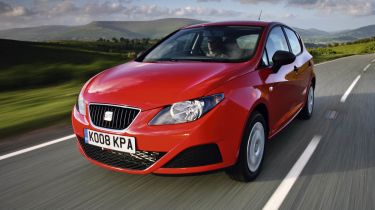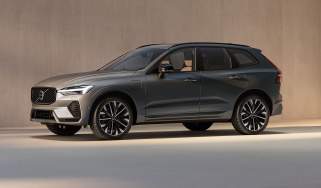SEAT Ibiza ECOmotive
We put new fuel economy world champ to the test on UK roads.

The second generation firmly establishes the Ibiza Ecomotive as one of the most environmentally friendly cars on the road. Only the less practical Smart ForTwo CDI can claim lower emissions. While SEAT’s ageing three-cylinder diesel engine is not the most refined around, you will soon forgive its clatter when you start returning fuel economy of 70mpg and beyond and no longer have to shell out for road tax. Best of all, the newcomer is as understated as eco cars get. The question is, just how much further can motor manufacturers take the efficiency of regular combustion engines?
It’s a record breaker! Back in May, this second generation of the SEAT Ibiza Ecomotive covered 970 miles on a single 45-litre tank of fuel, smashing the best-ever economy mark for a car in its class with an average of 97.4mpg.
But while it’s undoubtedly the star when it comes to efficiency, we wanted to find out how good this super-frugal SEAT is on a day-to-day basis.
Video: watch CarBuyer's video review of the SEAT Ibiza
[[{"type":"media","view_mode":"content_narrow","fid":"68319","attributes":{"alt":"","class":"media-image"}}]]
A selection of aerodynamic and mechanical tweaks has slashed CO2 emissions to 98g/km and cut consumption to 76.3mpg. The latter is better than the new Toyota Prius, and exactly the same as the Ibiza’s Ford Fiesta ECOnetic rival.
The difference is that the £11,605 SEAT undercuts the Ford by around £500. And that’s before you consider that the tiny carbon footprint means the former is exempt from road tax!
Barring the 88g/km Smart ForTwo CDI, the Ecomotive takes the title of the least polluting diesel car on sale in the UK today. So, how does it achieve such significant gains over the standard car when power comes from exactly the same engine – the VW Group’s familiar three-cylinder 1.4-litre TDI oil-burner? The main contributors to the fuel-sipping performance are improvements to the ECU software and longer third, fourth and fifth gear ratios. SEAT has fitted skinny, low-rolling-resistance tyres, too.
The oil-burner makes quite a clatter on start-up and at low rpm, but pile on the revs and it becomes increasingly refined – to a point where engine noise is acceptable on the motorway.
Below 2,000rpm, the throttle pedal has little effect, despite the racket from under the bonnet. But push above that, and there’s plenty of torque to make decent progress, accompanied by a classic three-cylinder thrum.
Those tyres don’t detract from the driving experience, either. In fact, the lower grip adds to the cornering fun – you can feel exactly what all four tyres are doing beneath you. The lower weight also means steering feedback is good.
SEAT has updated the aerodynamics to help ensure the new Ecomotive slips through the air with the minimum disturbance. Making things easier for the engine are a newly designed front grille with blocked-off slats on the upper air intake, a reworked rear spoiler and flush wheel trims.
There’s even a standard diesel particulate filter (DPF), which prevents soot particles leaving the exhaust. In the UK, legislation doesn’t yet demand a DPF is fitted – which shows you just how seriously SEAT is committed to the environment with this car.
A five-door is available alongside the three-door Sport Coupé we drove, and both return identical economy.
In SC guise, the Ecomotive looks as stylish as more conventional models, although the aerodynamic wheel trims appear a little undersized.
Engineers have worked hard to keep the weight down by selecting equipment carefully and eliminating certain options. But the cabin isn’t as barren as you’d expect, with air-con and a six-speaker MP3 stereo fitted as standard. Creature comforts such as rear parking sensors and cruise control can even be added.
Stylish and fun, the Ecomotive is proof that you don’t need lithium-ion batteries or complex hybrid powertrains to produce astonishing fuel economy.
Rival: Ford Fiesta ECOnetic
The Ford has already won us over in standard guise with its funky looks and sharp dynamics. The ECOnetic retains those attributes, and adds
outstanding fuel economy and low running costs to the mix.






